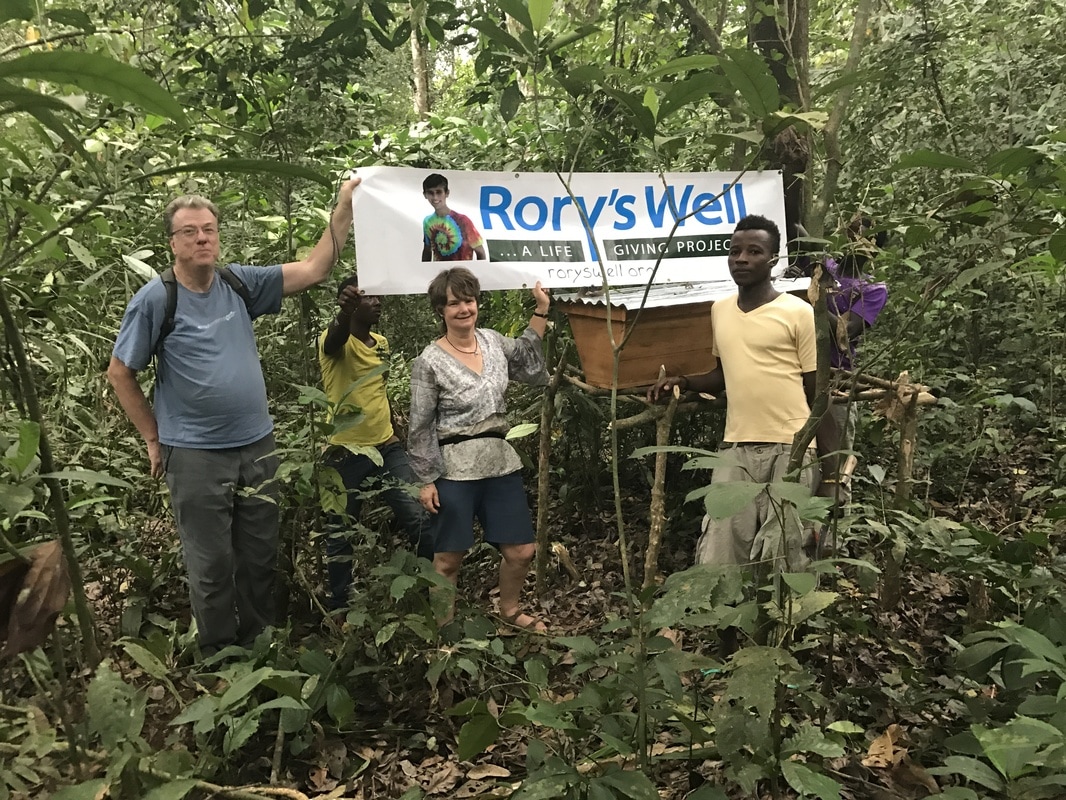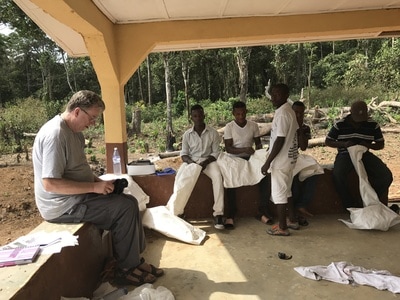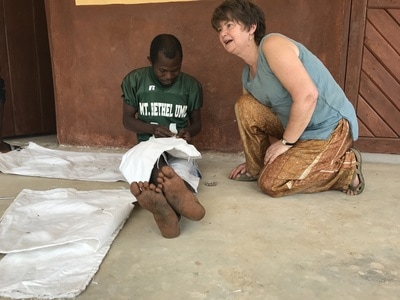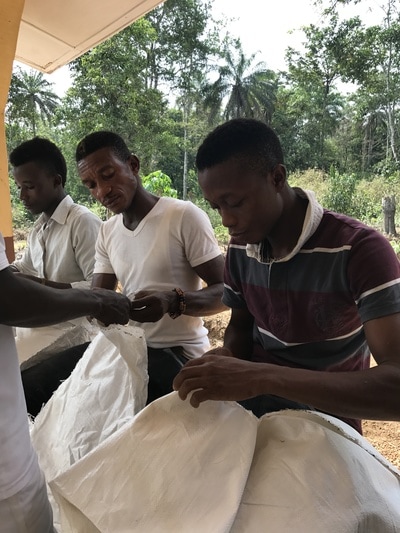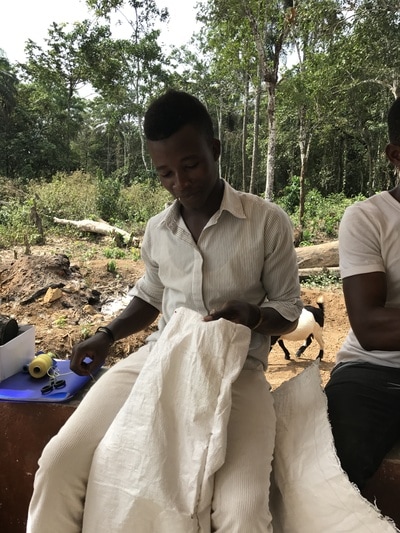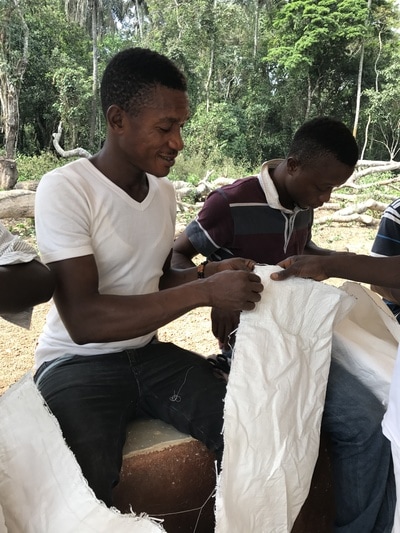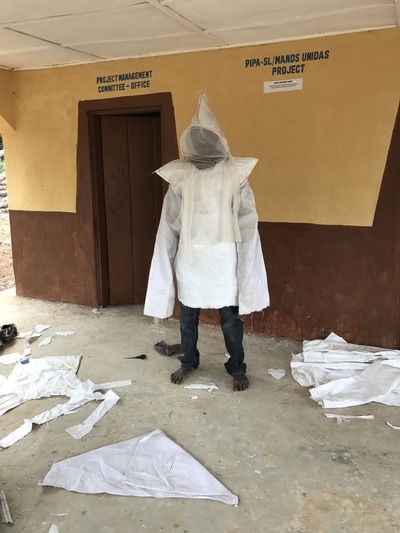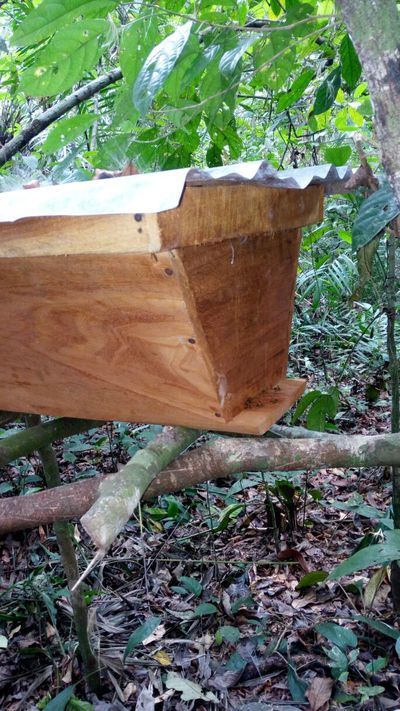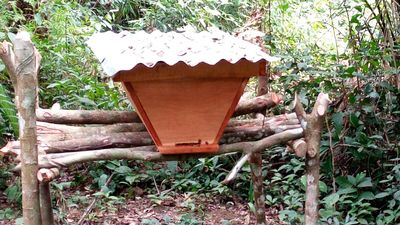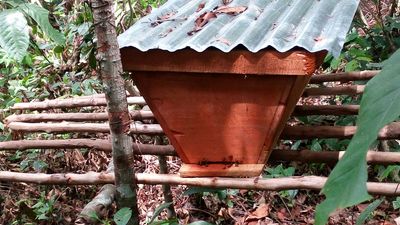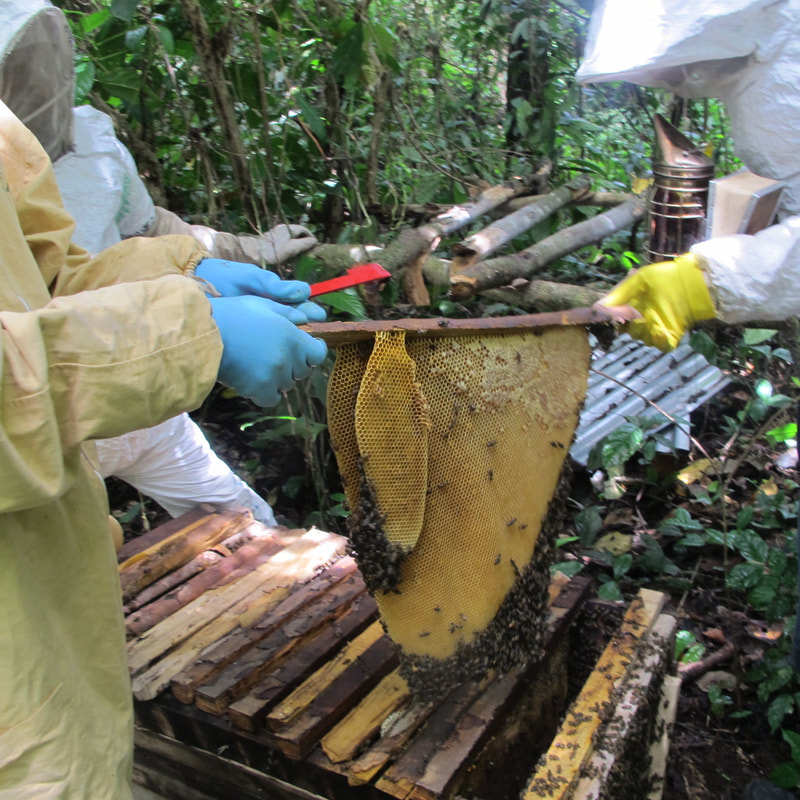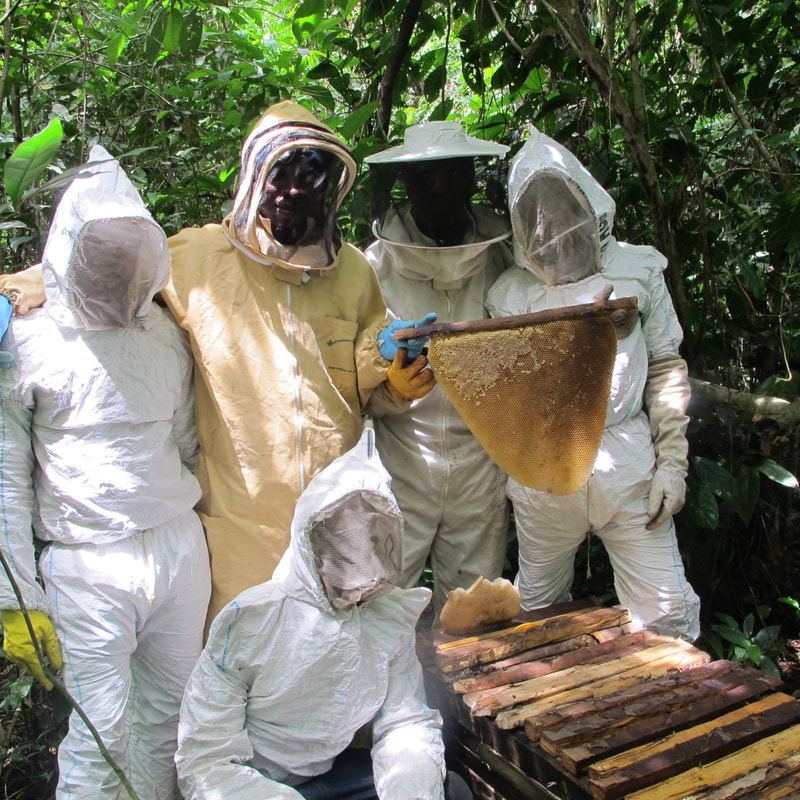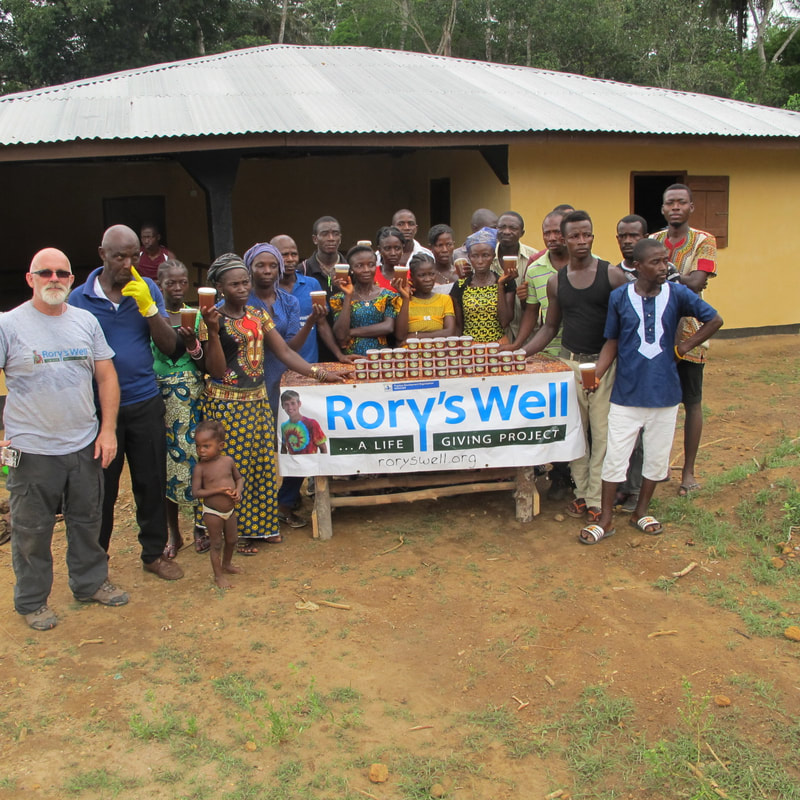Rory’s Well Bee Farming - A Joint Project With Bees Abroad
The opportunity:
Bee Farming gives small pastoral communities, such as the ones that Rory’s Well has been working with, the opportunities to generate livelihoods for those willing to work with bees. The forest villages are surrounded with an abundance of forest flowers and many ‘bee hunters’ are already harvesting honey from wild bee colonies. Bee Farming allows such harvesting to be more sustainable by using local resources to build hives and equipment, only taking some honey from each colony and not destroying it, and harvesting other hive products* to produce marketable commodities. By marketing honey and other bee products in local markets and farther afield a valuable source of income is produced which can stimulate further economic activity in impoverished villages. Other activities are necessary to support bee farming and hence improve livelihoods across more than just the beekeepers and their families. Supportive activities that can be done by the beekeepers or others with specialist skills include: hive building (local carpenters), beesuit manufacture (tailors/seamstresses), tools (metal and wood workers), honey processing, working with wax and other hive products, marketing etc. A single hive occupied by bees for one year can produce up to 100 pounds of honey each year. The local economy is pretty much subsistence farming and average earnings are no more than £1 a week so this has a high potential impact. A valuable side-product of having more bee colonies in an area is that there will be more pollination of crop-bearing plants and trees and hence more food and an improved local ecology.
* as well as honey for eating the other hive products are:
(1) wax that can be used to make creams, lotions, polishes and even high quality soap
(2) propolis which is a valuable natural antiseptic
(3) honey for treating wounds
Rory’s Well is working in partnership with Bees Abroad (www.beesabroad.org.uk) to support Bee Farming in the Barri Chiefdom, Pujehun District, SW Sierra Leone.
* as well as honey for eating the other hive products are:
(1) wax that can be used to make creams, lotions, polishes and even high quality soap
(2) propolis which is a valuable natural antiseptic
(3) honey for treating wounds
Rory’s Well is working in partnership with Bees Abroad (www.beesabroad.org.uk) to support Bee Farming in the Barri Chiefdom, Pujehun District, SW Sierra Leone.
How it works:
For those of you familiar with beekeeping in the UK the equivalent developed in Africa is somewhat different. It has to be low cost and as simple as possible. So hives are made from locally available materials and beesuits are made from 3 maize sacks at as low a cost as possible. Instead of buying bees the process is to site a top-bar hive baited with wax in a known area of wild bees. Once bees are in occupation they will expand and start collecting nectar to produce honey. African bees do not like disturbance so unlike the UK inspections are kept to a minimum and honey can be taken off twice a year. From there it is separated from the wax and packaged for sale. Wax can also be processed for creams and lotions.
Scoping and Assessment Visit to Barri Chiefdom, Sierra Leone:
Neil and Kath Brent visited Sierra Leone (6-20 February 2017) in order to assess potential for bee farming in the area. Five villages were visited: Korigboma, Mano, Makka, Semabu, and Taninahun meeting with the chief and meet villagers who wanted to farm bees and discuss the project with them. From the start it was clear that there was a lot of interest in all the villages. These visits also involved walking to places where there were known to be wild bees. The individuals who came forward were mostly ‘honey-hunters’ who find wild bees and then take their honey; in the process this can mean that colonies are destroyed. Bee Farming aims to maintain hives of bees for longer periods. Whilst these site visits were happening a carpenter and two local apprentices were busy making seven hives for siting close to each of the five villages.
We were also able to visit one of the villages at an older bee-farming project in the Gola Forest. This was part of a wider forest conservation project managed by Welt Hunger Hilfe (a German Aid Agency) – http://www.welthungerhilfe.de/en/about-us/media-centre/artikel/mediathek/sierra-leone-final-evaluation.html. The bee-farmer in the village was asked and agreed to assist in training bee-farmers in the Rory’s Well project.
Before the hives were sited a training day whereby one beekeeper from each village came to Taninahun and made a beesuit from materials we had purchased.
We were also able to visit one of the villages at an older bee-farming project in the Gola Forest. This was part of a wider forest conservation project managed by Welt Hunger Hilfe (a German Aid Agency) – http://www.welthungerhilfe.de/en/about-us/media-centre/artikel/mediathek/sierra-leone-final-evaluation.html. The bee-farmer in the village was asked and agreed to assist in training bee-farmers in the Rory’s Well project.
Before the hives were sited a training day whereby one beekeeper from each village came to Taninahun and made a beesuit from materials we had purchased.
This proved to be very successful and there are now five functioning beesuits in store at the Taninahun training centre. These have been supplemented by five pairs of wellington boots to complete the protection. At this point it has to be said that all the villagers we spoke to referred to African bees as being ‘very wise’. We understood this to mean that they can be quite aggressive – hence the protective suits. African bees are also 1/3 smaller than our European varieties.
The final stage or our scoping and assessment visit was to revisit the five villages and site hives close to colonies of wild bees. The hope was that when these colonies swarm they would go into the sited hive. To attract bees to the hives they were baited with beeswax, indeed we had enough wax to set a strip of wax on each of top-bars in each of the hives. As well as attracting bees into hives this will encourage them to build comb in a way that enables beekeepers to inspect and take out honey. We understand that within two weeks of our leaving four out of the seven hives had been occupied. We found a great deal of enthusiasm for bee farming across many in each of the villages and an understanding of some of the potential.
The final stage or our scoping and assessment visit was to revisit the five villages and site hives close to colonies of wild bees. The hope was that when these colonies swarm they would go into the sited hive. To attract bees to the hives they were baited with beeswax, indeed we had enough wax to set a strip of wax on each of top-bars in each of the hives. As well as attracting bees into hives this will encourage them to build comb in a way that enables beekeepers to inspect and take out honey. We understand that within two weeks of our leaving four out of the seven hives had been occupied. We found a great deal of enthusiasm for bee farming across many in each of the villages and an understanding of some of the potential.
During our stay we were also able to demonstrate to local health workers how beeswax can be used to make creams and lotions incorporating local herbs.
Immediate Plans:
We plan to revisit all the villages later this year to see how the hives are doing and to harvest the first batch of honey. This visit will begin the training of village beekeepers including:
How to inspect bees
How to harvest honey
How to process and package honey
How to make hives, suits and other equipment
We will not be able to cover all aspects at one visit but hope to cover enough for local bee-farmers to be able to carry out basic tasks. Training will take place at the Rory’s Well training centre in Taninahun.
We hope to be returning when there will be honey to harvest because that will enable us to demonstrate the practicalities of producing high quality clean honey. Before we travel we will be sourcing (in Freetown) suitable containers for marketing and designing and producing labels. This will make the honey product marketable in the larger supermarkets and maximise earnings for bee-farmers. The label design will include a picture of the local forest (including flowers) and something like the following strapline: Pure Honey from Barri Chiefdom – The Sweetness of the Forest”. We hope that this can be translated into Mende and Krio, the local languages for the villages and for Freetown.
Longer term plans
This is the beginning of a planned five year plan to encourage and support bee-farming in the Barri chiefdom involving all genders and across a wide age range. At the end of the five years we hope that bee-farmers in the villages Rory’s Well supports will:
The underlying principle we are following is that this project should be wholly sustainable not only during it’s five years but well beyond.
How to inspect bees
How to harvest honey
How to process and package honey
How to make hives, suits and other equipment
We will not be able to cover all aspects at one visit but hope to cover enough for local bee-farmers to be able to carry out basic tasks. Training will take place at the Rory’s Well training centre in Taninahun.
We hope to be returning when there will be honey to harvest because that will enable us to demonstrate the practicalities of producing high quality clean honey. Before we travel we will be sourcing (in Freetown) suitable containers for marketing and designing and producing labels. This will make the honey product marketable in the larger supermarkets and maximise earnings for bee-farmers. The label design will include a picture of the local forest (including flowers) and something like the following strapline: Pure Honey from Barri Chiefdom – The Sweetness of the Forest”. We hope that this can be translated into Mende and Krio, the local languages for the villages and for Freetown.
Longer term plans
This is the beginning of a planned five year plan to encourage and support bee-farming in the Barri chiefdom involving all genders and across a wide age range. At the end of the five years we hope that bee-farmers in the villages Rory’s Well supports will:
- each have at least five hives
- be able to make and maintain hives and equipment
- have an established centre for honey processing and packaging
- be able to process other hive products into marketable commodities: wax, propolis etc
- have a means to market products so as to maximise income
- be able to manage income from bee-farming: livelihood, education, investing to maintain equipment
- be prepared to pass on training to new bee-farmers in their home villages and others in the Barri Chiefdom
The underlying principle we are following is that this project should be wholly sustainable not only during it’s five years but well beyond.
Rory’s Well Goes Down The Wye for Bees in Sierra Leone
|
Angela Salter and Kath Brent are Kayaking 40 miles of the River Wye from Hoarwithy to Brockweir from 19 July to 21 July 2018 to raise funds for “Rory’s Well Gets Buzzing”. Funds are needed to increase the number of hives for current bee farmers and to provide training and hives for more villages. In addition we want to initiate bee-farming training at the local secondary school which will be important for the continuity of the bee-farming project.
All funds raised will train and support bee farmers to make hives, manage bees, process and market honey and other hive products. This is a sustainable project that will add to the livelihood opportunities of villagers in the Pujehun District of Sierra Leone.We aim to use resources that are locally available and to facilitate training beyond the timescale of the project.
Indicative Costs Bee Hive £10 Bee Smoker £10 Bee Suit £3 Training a bee farmer£50 We are currently focussing on 5 villages and, as noted above, we are making plans to expand to further villages and the nearby secondary school. Since last November 12 bee farmers have been trained (7 men and 5 women), 61 hives have been built, of which 36 are occupied by bees, 56 pounds of honey and 5 pounds of beeswax have been produced. More bee farmers and more hives means more honey and more money for villages that do not have much. Help us to enable this! |

